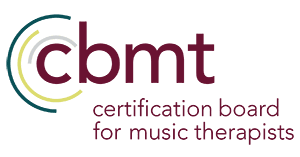2024 CBMT Practice Analysis: MT-BC Survey Coming Soon
“As practitioners, YOU are the voice of your profession,” said Sarah Laing, MMEd, MT-BC, who chairs the Practice Analysis Committee shepherding this year’s process.
The practice of music therapy is a living, breathing process that changes, develops, and improves over time. That’s why every five years, CBMT undertakes a new Practice Analysis process to update CBMT’s credentialling exam for the music therapy profession. The goal is to incorporate changes in the way music therapy is evolving.
There are two steps that involve the community of MT-BCs:
☑ Select a representative group of MT-BCs to make up the Practice Analysis Committee (PAC)
☐ Send a survey to every active MT-BC – coming soon!
The last Practice Analysis was completed in 2019, and the process for the new 2024 Practice Analysis was kicked off last year with the selection of the 10 new members for the current PAC.
Since CBMT’s primary responsibility is to administer the certifying examination for the MT-BC credential, it is essential the exam is based on the music therapy Practice Analysis – valid job analysis data is collected and extrapolated with participation of current MT-BCs.
During the 2019 Practice Analysis process, many MT-BCs participated, including those living outside the U.S. from 10 other countries. With over 10,000 current MT-BCs, CBMT expects to see even wider participation this year.
The Role of the New Practice Analysis Committee
Every PAC member holds the MT-BC credential, and all are practitioners and educators who apply and are appointed to the committee by the CBMT Board’s Development Committee. The PAC is intended to represent a cross-section of MT-BCs that have been certified by CBMT.
The Practice Analysis process validates the tasks performed and the knowledge needed to provide safe and effective practice. Survey participants are asked to respond to the survey by providing a realistic portrayal of their actual experience as a music therapist.
“The Practice Analysis process involves the entire MT-BC community,” said CBMT’s new Executive Director, Jennifer Mankowski, BSN, RN. “MT-BC Committee volunteers work directly with the testing vendor, and invite current board-certified music therapists to participate in the process through the Practice Analysis Survey. The information provided in the survey is used as a basis for the development of the examination. The MT-BC community of professionals and their participation in the Practice Analysis Survey is an essential step in the process.”
To participate in the survey you must have an updated email address in your CBMT account.
Impact Your Profession – Complete the Survey Coming Soon
The work of the new PAC members began in earnest earlier this year. The PAC is now completing the new Practice Analysis Survey that will be emailed to all board-certified music therapists in late September. Data regarding music therapy knowledge and skills is collected on the detailed survey.
“The Committee has developed a new Practice Analysis Survey where each of you has the opportunity to identify your actual on-the-job requirements,” Sarah said. “As the field of music therapy continues to morph, it is essential that these competencies are accurately reflected in the Board Certification Domains. These domains, in turn, drive the Examination content.”
Completed surveys will be due in October, and the data analysis on the survey results will occur when the completed surveys are received.
Hear more from PAC members about the importance of the survey and your role in the Practice Analysis.

The Relevance and Impact of CBMT’s Board Certification Domains
Board Certification Domains define the body of knowledge that represents competent practice in the profession of music therapy. And, continuing education credits must relate to an area identified in the Board Certification Domains.
“Be empowered to advance the music therapy profession and ensure your experience is reflected in the Practice Analysis,” urged Alaine E. Reschke-Hernandez, PhD, MT-BC, Chair, Continuing Education Committee. “In this grassroots effort, your voice influences the evolution of the Board Certification Domains and has a ripple effect on the design of continuing education opportunities and state of the profession for years to come.”
The new test questions developed through this process will be incorporated into the CBMT Board Certification exam beginning in the fall of 2025, after being pre-tested to ensure content validity and reliability. Where changes are noted, questions may be revised. Older exam questions that are no longer relevant are retired.
Andrea Crimmins, PhD, MT-BC, Chair of the CBMT Board of Directors, reminds us all: “We need every board-certified music therapist to participate in this very important process by taking the time to thoroughly and conscientiously complete the survey. The collective information gathered from all music therapists best represents current practices across regions, clinical areas, and philosophical backgrounds.”
About CBMT Practice Analysis
The Practice Analysis is developed using guidelines issued by the U.S. Equal Employment Opportunity Commission and American Psychological Association standards for test validation. CBMT also works with a testing firm, PSI, and adheres to the guidelines of the American Educational Research Association and the National Council on Measurement in Education. The MT-BC program is accredited by the National Commission of Certifying Agencies, the accrediting body of the Institute for Credentialing Excellence, ICE, which additionally requires these practices to be followed. Board-certified music therapists must practice within the Board Certification Domains and adhere to the CBMT Code of Professional Practice.


